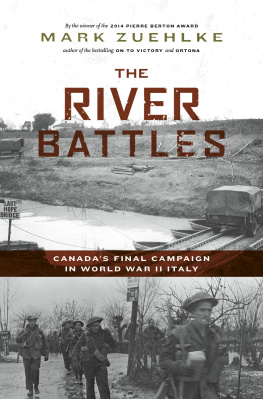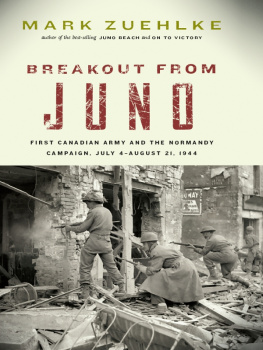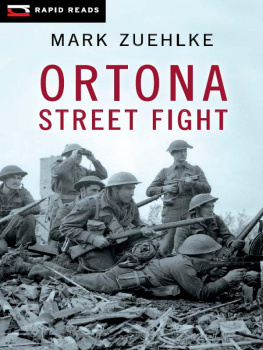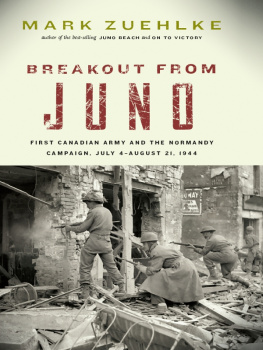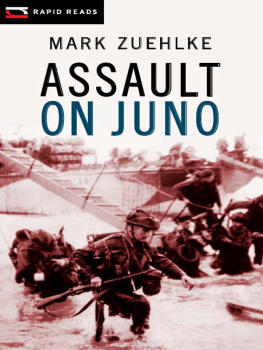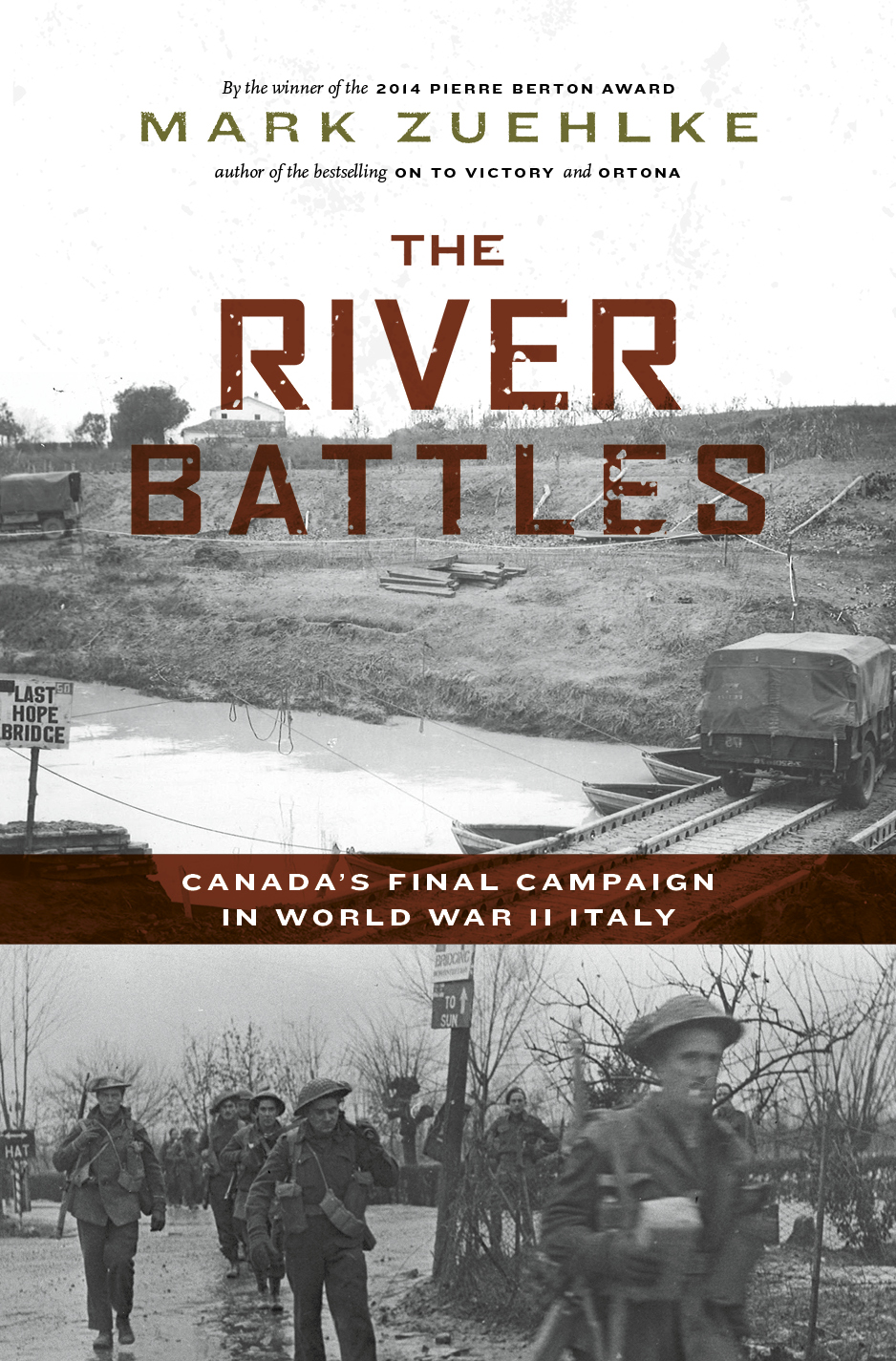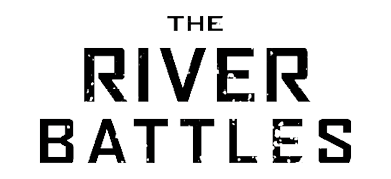
Canadas Final Campaign
in World War II Italy

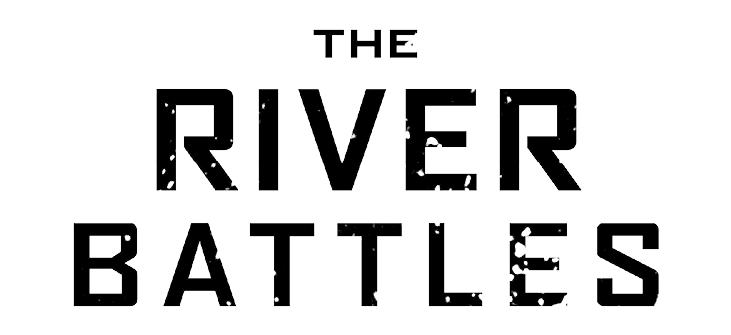

Copyright 2019 Mark Zuehlke
All rights reserved. No part of this publication may be reproduced, stored in a retrieval system or transmitted, in any form or by any means, without prior permission of the publisher or, in the case of photocopying or other reprographic copying, a licence from Access Copyright, .
Douglas and McIntyre (2013) Ltd.
P.O. Box 219, Madeira Park, BC , V0N 2H0
www.douglas-mcintyre.com
Editing by Kathy Vanderlinden
Dust jacket typesetting by Shed Simas / Ona Design
Typesetting by Shed Simas / Ona Design
Maps by Stuart Daniel
Jacket photographs: top: Courtesy of Seaforth Highlanders Regimental Museum; bottom: Photographer unknown, LAC e999920233-u
Printed on 100 % recycled paper
Printed and bound in Canada



Douglas and McIntyre (2013) Ltd. acknowledges the support of the Canada Council for the Arts, which last year invested $ 153 million to bring the arts to Canadians throughout the country.
Nous remercions le Conseil des arts du Canada de son soutien. Lan dernier, le Conseil a investi 153 millions de dollars pour mettre de lart dans la vie des Canadiennes et des Canadiens de tout le pays.
We also gratefully acknowledge financial support from the Government of Canada and from the Province of British Columbia through the BC Arts Council and the Book Publishing Tax Credit.
Library and Archives Canada Cataloguing in Publication
Title: The river battles : Canadas final campaign in World War II Italy / Mark Zuehlke.
Names: Zuehlke, Mark, 1955- author.
Series: Canadian battle series (Vancouver, B.C.)
Description: Series statement: The Canadian battle series | Includes bibliographical references and index.
Identifiers: Canadiana (print) 20190149930 | Canadiana (ebook) 20190149949 | ISBN 9781771622356 (hardcover) | ISBN 9781771622363 ( HTML )
Subjects: LCSH : World War, 1939-1945CampaignsItalyEmilia-Romagna. | LCSH : World War, 1939-1945 Riverine operationsItalyEmilia-Romagna. | LCSH : Canada. Canadian Army. Canadian Corps, I History. | LCSH : Canada. Canadian ArmyHistoryWorld War, 1939-1945. | LCSH : World War, 1939-1945Canada.
Classification: LCC D 763. I 82 E 45 2019 | DDC 940.54/2154dc23
The Canadian Battle Series*
The Cinderella Campaign: First Canadian Army and the Battles for the Channel Ports
Forgotten Victory: First Canadian Army and the Cruel Winter of 194445
Tragedy at Dieppe: Operation Jubilee, August 19, 1942
Breakout from Juno: First Canadian Army and the Normandy Campaign, July 4August 21, 1944
On to Victory: The Canadian Liberation of the Netherlands, March 23May 5, 1945
Operation Husky: The Canadian Invasion of Sicily, July 10August 7, 1943
Terrible Victory: First Canadian Army and the Scheldt Estuary Campaign, September 13November 6, 1944
Holding Juno: Canadas Heroic Defence of the D -Day Beaches, June 712, 1944
Juno Beach: Canadas D -Day Victory, June 6, 1944
The Gothic Line: Canadas Month of Hell in World War II Italy
The Liri Valley: Canadas World War II Breakthrough to Rome
Ortona: Canadas Epic World War II Battle
A Canadian Battle Series Companion*
Through Blood and Sweat: A Remembrance Trek Across Sicilys World War II Battlegrounds
Other Military History Books by Mark Zuehlke
The Canadian Military Atlas: Four Centuries of Conflict from New France to Kosovo (with C. Stuart Daniel)*
Brave Battalion: The Remarkable Saga of the 16th Battalion (Canadian Scottish) in the First World War
The Gallant Cause: Canadians in the Spanish Civil War, 19361939
For Honours Sake: The War of 1812 and the Brokering of an Uneasy Peace
Ortona Street Fight
Assault on Juno
*Available from D&M (2013) Publishers Inc.
Six and twenty panther tanks
Are waiting on the shore,
But Corps intelligence has sworn
That there are only four.
We must believe there are no more,
The information comes from Corps,
So onward to Bologna
Drive onward to the Po!
On our way to Venice, we had a lovely time
We drove a bus from Rimini right through the German line.
Then to Bologna we did go
We all went swimming in the Po.
We are the D -Day Dodgers, in sunny Italy.
Verses from the Canadian version of We Are the D -Day Dodgers, added during the fall of 1944. Sung to the melody of Lili Marlene.
Harry, youll like Italy. It has good food, willing ladies, and pretty countrywhenever it stops raining.
Chris Vokes to Harry Foster
To a man, we had one goal, and that was to return to Canada and our families in about the same physical condition we had brought with us to Italy. Nothing morenothing less.
Private Stan Scislowski, Perth Regiment
Contents
- Epilogue
- Appendix A
- Appendix B
- Appendix C
- Appendix D
- Appendix E
Preface
On a warm spring day in 2006, I sat in the sun-drenched living room of Loyal Edmonton Regiment veteran John Dougans Saanich Peninsula home near Victoria. Across Haro Strait, Mount Bakers snow-cloaked volcanic cone thrust into a brilliantly blue sky. I had come to interview Johnny for my fourth book on the Italian CampaignOperation Husky. It seemed fitting to us that we were looking out at a volcano while talking of a time when Johnny had marched under a searing sun across the battlefields of Sicily with another volcanoMount Etnalooming on the eastern flank of the Canadian line of advance. Over the years, I had interviewed Johnny several times, and a friendship had developed. After a couple of hours, his memories and thoughts on the Sicilian campaign concluded, conversation turned from the beginning of Canadas World War II experience in Italy to the months before its end. I mused that there might not be enough in that story to justify a book. Johnny, who had returned from the war to be chosen in 1946 as Albertas Rhodes Scholar and then to pursue a long and distinguished career in the Department of External Affairs, with many overseas postings, was a thoughtful and intelligent man. I had come to respect his insights. He mulled the question over for a while and then nodded. There wasnt a lot of forward movement. Things were mostly static. Im not sure it could carry a book.
It was not just Johnnys observation that dissuaded me. Discussions with historians at the Department of National Defences Directorate of History and Heritage and elsewhere led to the same conclusion. Those months from late September 1944 to February 1945 had, it was true, seen hard fighting under the bitterest circumstances of weather. But very little ground had been won, and this for little apparent strategic gain. That was the gist of virtually every conversation.

